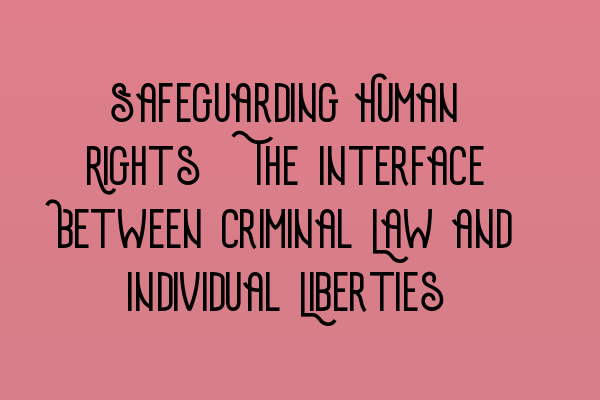Safeguarding Human Rights: The Interface Between Criminal Law and Individual Liberties
Human rights form the cornerstone of a just and fair society. The criminal law plays a crucial role in safeguarding these rights, ensuring that individuals are protected from infringement and guaranteeing a fair process for those accused of crimes. In this article, we explore the interface between criminal law and individual liberties, and the importance of striking a balance between the two.
The criminal law system is designed to maintain order and protect society from harm. It provides a framework within which crimes are identified, investigated, and prosecuted. However, it is vital to remember that the criminal law operates within the broader framework of human rights.
When discussing criminal law and individual liberties, it is important to consider key concepts such as due process, the right to a fair trial, and the presumption of innocence. These fundamental principles ensure that individuals accused of crimes are treated fairly and that their rights are protected.
One crucial aspect of safeguarding individual liberties is the right to legal representation. Every person accused of a crime has the right to be represented by a solicitor who can provide legal advice and ensure their rights are upheld throughout the criminal justice process. Law firms such as SQE Criminal Law & Practice Law UK offer comprehensive legal services to ensure that individuals facing criminal charges have access to skilled and knowledgeable solicitors.
To understand the interface between criminal law and individual liberties better, it is essential to delve into specific cases and situations where these issues arise. For instance, the topic of police powers and stop and search provides a relevant example. While the police have the authority to stop and search individuals in certain circumstances, this power must be exercised within the boundaries of human rights. Balancing the need for effective crime prevention with the protection of individual liberties is a delicate task.
In recent years, there has been a growing conversation about the use of technology in criminal investigations and the potential impact on individual privacy. The advent of new technologies such as facial recognition and surveillance cameras raises concerns about the potential infringement of privacy rights. Striking the right balance between using technology to solve crimes and protecting individual privacy is an ongoing challenge that must be addressed within the framework of human rights.
At SQE Criminal Law & Practice Law UK, we firmly believe in upholding human rights while ensuring the effective functioning of the criminal justice system. Our solicitors are dedicated to protecting the rights of our clients and providing them with expert legal representation. With our SQE 1 and SQE 2 preparation courses, aspiring solicitors can acquire the necessary knowledge and skills to navigate the interface between criminal law and individual liberties successfully.
In conclusion, safeguarding human rights is of utmost importance in the realm of criminal law. Balancing the need for effective crime prevention with the protection of individual liberties requires careful consideration and adherence to fundamental principles such as due process and the right to a fair trial. At SQE Criminal Law & Practice Law UK, we are committed to promoting and upholding human rights while providing expert legal services. To learn more about our courses and exam dates, visit our website and explore our SQE 1 Practice Exam Questions, SQE 1 Practice Mocks FLK1 FLK2, SQE 2 Preparation Courses, SQE 1 Preparation Courses, and SRA SQE Exam Dates articles.
